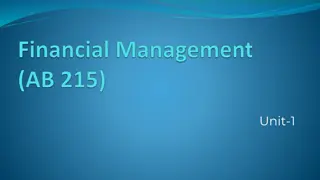Understanding Business Fundamentals and Financial Management for Entrepreneurs
This session introduces Module Four of starting a business, covering topics like the concept of business, challenges in raising startup capital, strategies for improvement, survival tactics, finance, and risk management. The content outlines the essence of businesses, financial statements, management policies, ethical issues, and performance measurements. It also explores reasons individuals start businesses and the difficulties in raising capital for startups.
Download Presentation

Please find below an Image/Link to download the presentation.
The content on the website is provided AS IS for your information and personal use only. It may not be sold, licensed, or shared on other websites without obtaining consent from the author. Download presentation by click this link. If you encounter any issues during the download, it is possible that the publisher has removed the file from their server.
E N D
Presentation Transcript
Module Four Session One Starting up a business Module 4: Session 1 1 9/13/2024
Objectives of the Session 1) Introduce module four 2) Recap of the introductory module - understanding the concept of business 3) Identify challenges faced in raising startup capital for a business. 4) Discuss strategies forimproving a Small Business Enterprise 5) Discuss business survival strategies Module 4: Session 1 2 9/13/2024
Introduction of Finance and Risk Management module Builds on the three previous modules Recaps the rationale for starting a business Examines the concept of risk in a business. Introduces the trainee to interpretation of performance and position statements Reviews financial management policies and ethical issues in financial management. By the end of the module trainees will be able to understand the essence of a business, the content and meaning of financial statements and appreciate policies that guide them and the ethical challenges to a finance manager. Module 4: Session 1 3 9/13/2024
Recap of earlier modules The nature of business enterprises; justification and limited liability preference. Business planning including budgetary planning and control, the budget as a yardstick for measuring and control of operations and use of KPIs. Performance measurement by profitability and ROI Performance measurement by cash, NPV, IRR and cash flow forecasts, short and long term. Module 4: Session 1 4 9/13/2024
Understanding a Business A business is an organization engaged in the trade of goods, services, or both to consumers and other businesses. In capitalistic economies, businesses are privately owned, they are administered to earn profit and to increase the wealth of their owners. Module 4: Session 1 5 9/13/2024
Reasons why people start own businesses Economic reasons wealth creation Self employment Financial Independence Adventure Passion Convenience work at home, flexible hours Module 4: Session 1 6 9/13/2024
Why is it so hard to raise capital for starting a new business? Most small businesses fail. Unproven business partners and model : Investors feel safe when they can see historical operating results Lack of coherent business plan. Inability to effectively communicate. Lack of ready investors. Module 4: Session 1 7 9/13/2024
Reasons why most small business fail Cash constraints Poor planning Poor management Bad Idea Ignoring risks in assessment of opportunities Misfortune Module 4: Session 1 8 9/13/2024
Strategies for improving a small scale business enterprise Marketing mix: (place, price, promotion, research & surveys) Technology: Use technology that you can to market yourself and get the word out. Staffing relationship: Offer flexible schedules and terms and benefits, e.g. health insurance Analysis of performance: When you run a small business, there is often little time to analyze what you are doing. Cash flow: Will make or break you Module 4: Session 1 9 9/13/2024
Turnaround strategies for a declining small business Organizational Change: Changes in management structure, key employees. Small Business Repositioning: An evaluation of a small business with declining profits, customers and sales can reveal a need to reposition business functions Decrease Overhead: In times of financial stress, small companies should look to slash costs and recoup sunk expenses. Module 4: Session 1 10 9/13/2024
Why is it Important for business owners to comply with regulatory requirements? Entrepreneurs must take care to ensure that they are compliant with the laws. Avoids default penalties and unnecessary prosecution that is diversionary Licensing and business-regulation requirements prevent other people from attacking your business Module 4: Session 1 11 9/13/2024
Compliance Contd. Considerations: A review of local regulations prior to getting into business Discrimination: Avoid discriminatory practices that are unconstitutional and unlawful. Safety: Observance of Occupational Safety and Health Module 4: Session 1 12 9/13/2024
Business survival strategies Watch your revenue and cash - Understand how much capital you have in the bank at all times, and realize when you will need to borrow to stay in business Stay updated on competition - Make sure you know what your competition is up to, and be ready to move in when they move out. Stay in shape: When your company hits tough times, you will be working more hours and trying to do more with less rest. Module 4: Session 1 13 9/13/2024
Group Activity 1.Explain what a business is and suggest reasons for starting up a business. 2. Discuss the common challenges faced in raising capital for a new business. 3. Explain the common reasons why most businesses fail and why you preferred to join road construction business. 4. Identify key financial challenges you have faced and suggest strategies to address them. 5. Discuss the reasons why it is important for new business entrepreneurs to understand and comply with different regulatory requirements in Uganda. Module 4: Session 1 14 9/13/2024
THE END Q & A Module 4: Session 1 15 9/13/2024























